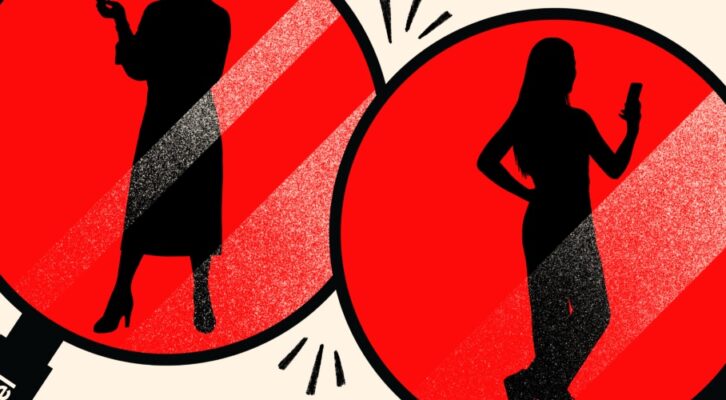The Challenge of Book-Tour Travel as a Non-Binary Author
Sandy Allen on the Endless Process of Coming Out
About a year ago, at a dinner for a group of writers who’d received a fellowship, a man, an advisor to the program, happened to sit near me. He asked what else I’d be writing about after I published my forthcoming first book, the story of my late uncle’s life. I said I’d continue to write about mental health and about gender.
The restaurant was high-ceilinged and loud, our party large. I found myself only talking to this man, who kept returning to the topic of gender, asking this time about my own. I wasn’t yet practiced at making chit-chat about that. My face grew hot. I indicated I’d rather not talk about myself.
He seemed incredulous, entitled to his line of questioning. He said I “opened the door” when I mentioned I’d be writing about gender.
I could have stopped answering his questions but didn’t. I found myself giving in. I wondered why I was doing this. He spoke of others he knew, younger people, who were themselves gender non-conforming. His eyes rolled a little. I suspected he thought this gender stuff silly, youthful folly. We’d spoken already about my husband and our lives.
“And your husband,” he asked, “how does he cope?”
I surged with fury later, alone in my hotel room.
*
It was only recently that I’d come out to my partner, therapist, and closest friends as non-binary and trans. Every day I grew slightly more comfortable, yet also slightly more terrified of all the new problems this change invited.
My book was to be published a few months later, in late January. Its cover said “Sandra” and the bio used she/her pronouns, but in my headshot, my hair was very short and my blazer olive. Months before, when these details were finalized, I hadn’t brought up the problem of my name or my pronouns.
I had thought about speaking up. I thought about it when I woke up at 4 am and while I did the dishes. I had long discussions with all sorts of people about the reality of my gender and how it related to to my decision to tell my uncle’s story—in my mind. But I kept to myself. My editors and I had already quibbled about so many things, and I didn’t feel I had the energy to bring up yet one more point. Besides, the matter still felt so intensely private. I wondered, too, whether avoiding the topic altogether might somehow discourage men like the one at dinner from targeting me.
But when my book published, I found myself regretting that decision. It felt like a lie; this cover that said “Sandra,” this jacket that said “she.”
I felt entirely silly being a 30-year-old who didn’t know such basic facts about myself. They? He? Judy?
For some months, my website had been candid that I am gender non-conforming, that I’m non-binary, that I’m trans. One day, I posted two bios on my website for people introducing me at live events: one that used “she,” and one with “they.” I changed the phrasing of these lines often, depending on my mood, how timid or bold I felt that moment. I felt entirely silly being a 30-year-old who didn’t know such basic facts about myself. They? He? Judy? I wished I could convince the entire English-speaking world to drop this gendered pronoun nonsense altogether rather than have to pick one out for myself.
At bookstores, I would hear strangers introduce “Sandra Allen” and wonder a moment who that was. But then, a couple weeks into my book tour, I was finally introduced as “they.” Hearing a stranger assert this, the rightness of it, thrilled me.
A reviewer emailed with a few questions. Among them: what was my preferred gender pronoun?
Again, I felt excitement. It was a question I had essentially never received so directly. I wrote back that I still went by she/her but I also liked they/them. The review went up. In it, the reviewer stated “Allen uses they/them pronouns” and called me “them” throughout.
Surprised messages from several people quickly appeared in my inbox, asking whether they’d missed something, apologizing if they had. I hadn’t spoken to any of them directly about my gender. So I sat and wrote an email coming out to everybody: my editors, my publicists, my agent. I said I was fine with both she/her and they/them, as I’d tried to tell the reviewer.
Was it honest, my answer? I couldn’t say. I wrote the reviewer back, asking for the piece to reflect the answer I had given them—she/her/they/them. They corrected it. For months after, I wondered whether this was the right choice.
In late spring, I did an event at a college. The student who introduced me was himself a trans man and called me they/them. I felt myself flutter.
Feeling courageous, I emailed everyone who works with me once more, apologizing for being such a bother, asking them to now refer to me by “they/them” only. I asked my editors, as well, whether the paperback could use these pronouns and Sandy, the gender neutral name I’ve long preferred, instead of Sandra. I had long fretted about this, figuring it might not even be possible to change a name on a book.
They wrote back that it was no problem.
*
Recently, a student reporter writing for her university’s paper asked me whether being non-binary influenced my choice to tell his story or the way I told it. I was glad someone finally asked this question. I told her that if anything, the opposite was true.
My gender nonconformity still often to me feels like an interruption, a distraction.
I was hesitant to talk about myself for a long time, in part, because the project I’m discussing with these audiences isn’t about me. It’s about my uncle. It’s about schizophrenia and madness and mental health care in America and why and how it’s broken. There is already too much for us to talk about, and my gender nonconformity still often to me feels like an interruption, a distraction.
I explained to her that had it not been for writing this book, I’m not sure I’d have ever read as deeply about gender as I was forced to. All those years I read and reported about “schizophrenia,” I found I was really reading about socially powerful categories that enforce hierarchies of power. Hence I also read about “gender,” after a lifetime of avoiding doing so. Hence I was finally honest with myself about myself, after a lifetime of avoiding being so. Or rather I had language, and an explanation, for what I am. For how I’ve always been.
In conversation these days, when a stranger or acquaintance calls me she/her I still opt not to correct, knowing that doing so would distract us from whatever it was I was actually attempting to discuss. And knowing that some people, especially of a certain age, might react to this idea that I am non-binary, I am trans, with eyes rolling. Or worse.
Perhaps this is wrong of me, that I don’t yet correct strangers who call me “she” (or “young lady,” or “good girl”). Perhaps over time I’ll grow the nerve to respond with white hot wit if a man ever again asks me a question like And your husband, how does he cope? (It’s a joke between us now. During moments of great bliss, I’ll look at him and say, “How do you cope?”)
At a small town book festival last fall, I spoke with the man who’d be introducing me. I told him to call me Sandy and to use they/them pronouns. He nodded. He got on stage and used a combination of “they” and “she.” More recently, another man introduced me before I gave a speech. Beforehand, he asked if there was anything I wanted him to say.
I tried to be extremely direct: “I’ve been coming out as non-binary this year,” I said. “So I go by they/them pronouns now, and Sandy. Even though the hardcover says Sandra.” He seemed to understand. Moments later, he introduced me to the crowd as she she she.
I still nailed my speech.
Toward the end of that speech, which was for a big group of doctors, I told them I was non-binary and trans. I acknowledged the political moment, this administration’s attempts to erase trans people. I said, I’m standing before you as someone who absolutely has a stake in the big conversation about what counts as normal and psychiatry’s policing of such. I implored them to think of the ways in which they can continue to push back against the bigotries they’ve been taught, and to recognize the full humanity of all people regardless of our differences.
The paperback has just published. Last month, I felt the UPS truck in my throat as it pulled up the hill. I could tell, somehow, my box of copies was on it. I was right. I lugged the box onto the dining room table and cut down the top to reveal the blue stacks of them, gleaming like guts.
I saw Sandy Allen over and over on the spines, they/them in my bio. I fell to the ground crying. I had never imagined it possible to see such a thing, to be such a thing. But there it was in ink: my name, my pronouns, my reality.
![]()
Sandy Allen’s A Kind of Mirraculas Paradise is available from Scribner.




















